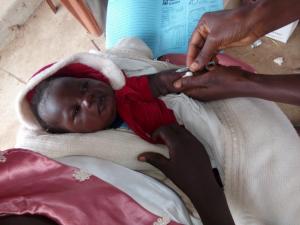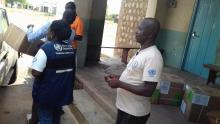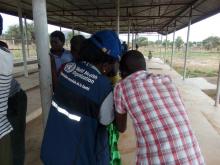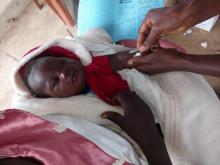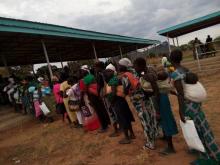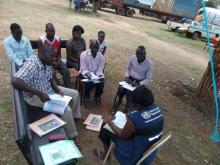WHO and partners reach displaced families with lifesaving supplies and services, in Lainya, the Greater Equatoria Region of South Sudan
Juba, 10 May 2017 - Despite intense insecurity, WHO and partners have delivered urgently needed supplies and services as part of the UN convoy to the Internally Displaced Persons (IDPs) in Lainya, South Sudan where the situation has deteriorated as a result of the conflict.
WHO’s convoy included 20 basic unit kits, 20 basic and supplementary kits (antimalarial drugs), assorted medical drugs, emergency vaccines and Expanded Program on Immunization (EPI) supplies, outbreak investigation kits and laboratory transport media. The 52 174 IDPs living in areas affected by conflict in Lainya will benefit from the lifesaving health supplies for the next three months.
In addition to routine vaccination and training of vaccinators and team supervisors for the mass measles campaign, WHO’s response team conducted a rapid health assessment to determine and address the key health needs. The team also begun a measles follow up campaign to immunize 9 113 children against measles in the IDP sites in Lainya, one of the hardest-hit areas of the Greater Equatoria Region. The County remains food insecure with over 3 000 people in Integrated Food Security Phase Classification phase 4 and 5 and over 9 000 recent new displacements.
Funding for the supplies and operations comes from the generous donations of the European Commission's Humanitarian Aid and Civil Protection department (ECHO) and the South Sudan Common Humanitarian Fund (CHF) have enabled WHO to focus its support on delivering lifesaving supplies to the affected communities.
“The mission is part of WHO’s emergency response plan, geared to provide conflict ridden areas of the Greater Equatoria Region with the much needed health and emergency nutrition services”, said Dr Allan Mpairwe, the WHO Emergency Coordinator. “This mission reaches people who have been fleeing for their lives because of the conflict. The region has been inaccessible to humanitarian assistance for several months.”
Of the more than 3 million South Sudanese who fled their homes because of the conflict, over 1.9 million remain displaced within the country. Most are sheltering in remote and hard to reach areas.
In addition to the current mission, WHO has also deployed over eight rapid response team for outbreak response and delivered over 16.4 metric tons of medical supplies to vulnerable populations and ensure access to emergency health and nutrition care to remote, hard-to-reach areas.
With the rainy season in sight, and a possible increase in communicable disease likely to bring new risks to people in conflict-affected areas, WHO prepositioned emergency medical supplies and drugs to protect more communities in need and to provide continued assistance for the areas that have already been reached.
The Greater Equatoria Region has long suffered repeated bouts of armed conflict, “Thanks to all involved parties, this life-saving corridor was now made possible”, says Dr Abdulmumini Usman, WHO Representative to South Sudan. Continued investment and commitment is required to increase the flow of life saving supplies and services to those affected both by the conflict and by the famine.
For more information please contact:
Dr Allan Mpairwe, +211 955 372 370, mpairwea [at] who.int (mpairwea[at]who[dot]int) Ms Jemila M. Ebrahim, +211 950 450 007, ebrahimj [at] who.int (ebrahimj[at]who[dot]int)



